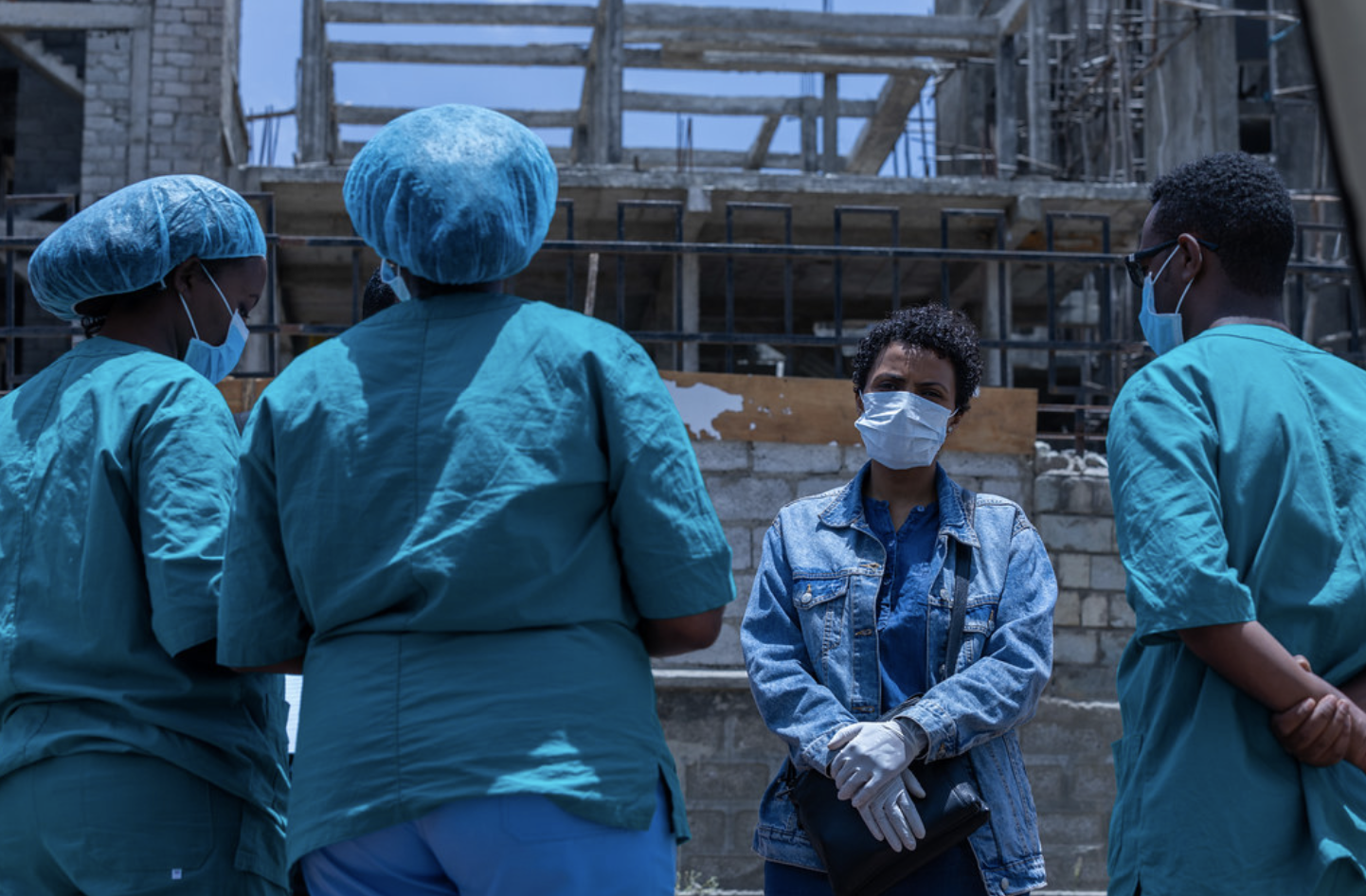Impact Investors Confront Coronavirus Crisis

UNICEF Ethiopia supporter Zeritu Kebede, facing the camera, visited the COVID-19 isolation center at Bole-Chefe, Ethiopia. She thanked the staff for their service in the face of serious logistical challenges and personal risks, and encouraged them to be steadfast. April 9, 2020 (Photo by Mulugeta Ayene courtesy UNICEF Ethiopia) Creative Commons license via Flickr
By Sunny Lewis for Maximpact
NEW YORK, New York, May 13, 2020 (Maximpact.com Community Solutions News) – A new coalition of impact investors has come together to bring their formidable entrepeneurial skills to bear on the novel coronavirus and the deadly disease it causes, COVID-19. The coalition aims to help communities around the world weather this crisis, and emerge with a renewed commitment to building a more inclusive and resilient system over the long-term.
The May 12 launch of the Response, Recovery, and Resilience Investment Coalition, less formally known as the R3 Coalition, is aimed at mobilizing and coordinating impact investors to quickly fill financing gaps in efforts to address this devastating crisis.
The collaboration is organized and managed by the Global Impact Investing Network (GIIN), a nonprofit worldwide network of 175 diverse organizations based in New York City’s Financial District. Its members include institutional asset owners, pension funds, insurance companies, asset managers, and advisors.
GIIN seeks to accelerate the development of impact investing by reducing barriers so more investors can allocate capital to fund solutions to the world’s most intractable challenges.
The COVID-19 pandemic certainly qualifies as an intractable challenge. Globally, as of 2:04pm CEST, May 13, there have been 4,179,479 confirmed cases of COVID-19, including 287,525 deaths, reported to the World Health Organization (WHO) since China first reported cases of the virus in Wuhan on December 31, 2019.
While there is no way to tell exactly what the economic damage from the COVID-19 pandemic will be, there is widespread agreement among economists that it will have severe negative impacts on the global economy.
According to Statista.com on May 5, where the global real Gross Domestic Product (GDP) grew by 2.9 percent in 2019, it is forecasted that COVID-19 will cause the global real GDP growth to decrease by 0.5 percent in 2020 compared to the previous year, to 2.4 percent growth.
Impact investors are already working to address the broad ripple effects of this crisis, and their role will only grow in time, GIIN states on its website.

A man with a wallet full of Euros, April 30, 2020 (Photo by Jernej Furman) Creative Commons license via Flickr
The new Response, Recovery, and Resilience Investment Coalition is being launched with broad collaboration across the global impact investor community and with financial support and guidance from: the David and Lucile Packard Foundation, the Ford Foundation, the John D. and Catherine T. MacArthur Foundation, the Open Society Foundations <opensocietyfoundations.org>, the Rockefeller Foundation <rockefellerfoundation.org>, and the Sorenson Impact Foundation.
As an immediate response, the R3 Coalition aims to showcase investment opportunities, particularly those related to health interventions, and access to capital for investors seeking new COVID-related investments. The objective is to direct capital efficiently toward high-impact solutions.
R3 Coalition partner The Rockefeller Foundation, for instance, has committed $20 million to fighting COVID-19.
Rockefeller Foundation President Dr. Rajiv Shah said, “This global pandemic has exposed the reality that too many Americans cannot meet their basic needs, and globally, too many communities lack the resources and technologies to adequately track, mitigate, and overcome this disease. The Rockefeller Foundation is ready to work in partnership with others to identify, invest, and scale-up solutions in the communities we serve here at home and around the world.”
The Response, Recovery, and Resilience Investment Coalition will function through virtual meetings that connect the participating impact investors to one another and to the information and opportunities that can help transform the response to the COVID-19 crisis.
R3 activities will be driven by a group of partner networks. Along with the GIIN, the Aspen Network of Development Entrepreneurs, the Asian Venture Philanthropy Network, B Lab, EDFI – Association of European Development Finance Institutions, European Venture Philanthropy Association, India Impact Investors Council, Mission Investors Exchange, and U.S. Impact Investing Alliance have already joined the initiative.
GIIN says it anticipates additional networks will participate as well.
Søren Peter Andreasen, chief executive of EDFI, is enthusiastic about the R3 initiative. “We applaud GIIN’s initiative to set up the R3 Coalition and we immediately wanted to support it. It is a welcome platform for the European DFIs to explore how we can join forces in our crisis response with an impressive group of impact investors. These investments are needed now to help businesses in vulnerable countries through the crisis, to save jobs, and to boost crucial supply chains for example such as for healthcare and agri-food products.”
GIIN is inviting those who are seeking co-investors for COVID-related investments and/or looking for new investments to place their capital to consider this coalition, as it aims to accelerate those efforts.
Fpr anyone wishing to learn more about the Response, Recovery, and Resilience Investment Coalition, GIIN is hosting three informational sessions in May. GIIN will also be using these sessions to gather participants’ input on the impact investing needs and opportunities they are aware of in response to COVID-19.
Informational Sessions – Register Below
- Friday, May 15th | 10am – 11am EDT: Register Here
- Monday, May 18th | 3pm – 4pm EDT: Register Here
- Wednesday, May 20th | 8pm – 9pm EDT: Register Here
GIIN’s Co-Founder and CEO Amit Bouri said, “Impact investing is more important than ever. Impact investors have been at the forefront of driving innovative solutions and in galvanizing collective action towards solving some of the world’s most pressing challenges. We must lean into this moment and into this leadership role to help address the needs arising from the current global crisis.”
“The GIIN and our R3 Coalition partners are committed to driving progress forward,” said Bouri, “and together, our efforts will not only help communities around the world weather this storm, but also emerge with a renewed commitment to building a more inclusive and resilient system over the long-term.”